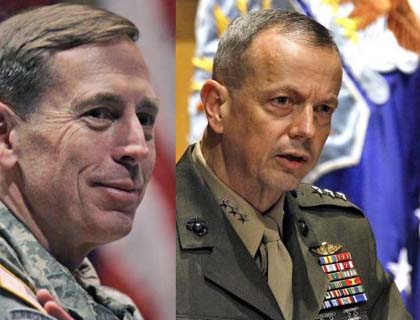V. Adm. McRaven nominated to lead U.S. Special Operations Command
WASHINGTON - Neither of the two men responsible for running the war in Afghanistan over the next year are willing to tell a Senate panel that the military is done with counterinsurgency in the U.S.' longest conflict. But from their testimony on Tuesday morning, both Lt. Gen. John Allen and Vice Adm. William McRaven see a glide path starting with the withdrawal of the surge forces: less tea drinking and more insurgent killing.
Night raids, drone strikes and other kill-and-capture efforts against insurgent leaders by the Joint Special Operations Command (JSOC) have already been a huge component of Gen. David Petraeus' war plan. "There will continue to be a counterterrorism dimension to the overarching counterinsurgency campaign," said Allen, Petraeus' designated successor, and "we may well see the development of counterterrorism become more important as time goes on."
McRaven certainly bolstered that perspective. Making his first public appearance since designing JSOC's successful mission to kill Osama bin Laden, McRaven said he was unconcerned about President Obama's drawdown of the surge forces. As long as he has "enablers" — airlift, helicopters, spy drones — then he doesn't think special operations will be strained. Elite commandos, after all, won't be the ones who leave Afghanistan any time soon.
"Intuitively, as the drawdown occurs in Afghanistan, the conventional force, there will probably be an additional requirement on special operations forces to cover down, if you will," McRaven, nominated to lead U.S. Special Operations Command, told the Senate Armed Services Committee.
Along with training the Afghan security forces, that's going to be the trend for at least the next year in Afghanistan. Allen has been very cautious not to say anything about new counterinsurgency missions to protect the population in eastern Afghanistan or take territory away from the Taliban and its allies in the Haqqani Network. Rolling back insurgent gains in the east will remain mostly the job of McRaven's forces.
Peter Mansoor, Petraeus' executive officer in Iraq, tells Danger Room that the Obama team's "decision to pull the plug on the surge forces prematurely means that the counterinsurgency campaign in Afghanistan ends in Helmand and Kandahar."
Tuesday's hearing, at least so far, has provided little reason to disagree with Mansoor. There is no talk here about any tradeoffs between air strikes and civilian casualties. Not much about working with the Afghan government, aside from blandishments about the "difficulty" posed by its corruption. Allen gave merely terse nods with integrating his war plans with incoming Amb. Ryan Crocker's diplomatic efforts. The residual mission in Helmand and Kandahar will be to "consolidate" military gains, Allen said.
And if Allen is upset by Obama's decision to take 33,000 troops out by September 2012, he's done an extensive job of hiding it. Every time a senator has asked him about the drawdown, he's promptly endorsed it, and pointed out that he'll still have 68,000 U.S. troops at his disposal. But he conceded, as Petraeus and Adm. Mike Mullen did last week, that the drawdown was "more aggressive than we had anticipated" and dodged a question about the military wisdom of ending the surge before the 2012 fighting season ends. In fact, at a few points when asked about the impact of the drawdown, Allen shot looks over his right shoulder, aimed at McRaven. That might be because McRaven and his special operations forces are the heart of Afghanistan war strategy from here on out. (Agencies)

